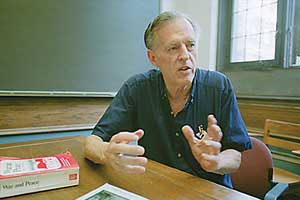Friedrich sees beyond boundaries of one discipline
By Seth SandersNews Office
 Paul Friedrich |
Anthropologists have long been seen as explorers who have journeyed far to live with people radically different from themselves. Their claim to special knowledge was based on a type of exoticism: the people they visited had to be significantly different in order to be valuable. It was this process of finding out what other people were really like that let anthropologists talk about what it is to be human.
So how does an anthropologist who epitomizes the field’s commitment to exploring diverse cultures end up teaching those Western classics Homer and Tolstoy in the Committee on Social Thought? For Paul Friedrich, Professor Emeritus in Anthropology and Linguistics and the Committee on Social Thought, as with many Social Thought professors, it is because he sees a big picture that does not necessarily fit with any one discipline’s boundaries. And after a lifetime of major contributions to social, cultural and linguistic anthropology, it is what he most wants to do.
Friedrich certainly has done his share of fieldwork; he lived three years with Mexican-Indian peasants and produced the works “Agrarian Revolt in a Mexican Village” and “The Princes of Naranja,” now considered classic in their combination of ethnographic observation and historical analysis.
As a linguist, he also produced “The Tarascan Suffixes of Locative Space: Meaning and Morphotactics,” “Proto-Indo-European Syntax: the Order of Meaningful Elements,” and “The Cross-Cultural Study of Semantic Structure,” topics he has taught in the Linguistics Department. This is the broad and deep perspective he brings to Greek and Russian literature.
Robert Pippin, the Raymond W. and Martha Hilpert Gruner Distinguished Service Professor and Chairman of the Committee on Social Thought, observed, “It’s hard to list an area where Paul hasn’t made a contribution. He’s a great, great colleague on the Committee on Social Thought, and the range of disciplines where he’s knowledgeable is just astonishing.”
For Friedrich, Homer, agrarian revolt and Tarascan suffixes are all part of a larger whole-how people make history through culture. Because of this, he explained, his work has always gone between literature, linguistics and anthropology.
Friedrich’s study and teaching of the classics in the context of social thought is still distinctive within anthropology, and it is a crossover he would encourage. In a recent article, he argued for the principle that “literary study is as indispensable to the comparative study of culture as anthropology is indispensable to the comparative study of literature.” He explained that the avoidance of central Western texts in much of anthropology has to do with what one anthropologist terms “inverse ethnocentrism,” the assumption, for example, that “any African praise singer has more linguistic skill than Leo Tolstoy.” The fact that Friedrich’s reading of the Odyssey appeared in American Anthropologist is indicative of how he has worked to get beyond both sorts of ethnocentrism.
Friedrich’s engagement with literature is long-standing. After spending his adolescence in Concord, Mass., near Thoreau’s famous Walden Pond, Friedrich earned an M.A. in Russian literature at Harvard University and went on to earn a Ph.D. in anthropology at Yale University.
His interest in Indo-European linguistics led him to work on Homeric Greek with the anthropologically oriented Chicago classicist James Redfield (the son of Chicago anthropologist Robert Redfield). This work led to the book The Meaning of Aphrodite. In the meantime he had been writing poetry, and in the 1970s, he began publishing it.
Along with the eminent poet Gary Snyder and the English professor Dennis Tedlock (whose training also is in anthropology), Friedrich became involved in the “ethnopoetics” movement during the 1980s, which brought the poetic works of various native peoples into the mainstream of American literature.
Each Spring Quarter, Friedrich continues to teach “Comparative Poetry and Poetics,” the core of which is modern Russian and English poetry, but which always includes T’Ang Chinese poetry as well. He said readings from 12 to 20 different poetic systems are covered in the class, which draws students from all over campus. “If there are 10 students, there will be eight departments represented.” For the last four years, Friedrich has been intensively teaching and researching Thoreau’s Walden and the Bhagavad Gita.
Friedrich said interest in literature among anthropologists and interest in anthropology among literary scholars have had parallel evolutions, but the crossover has been limited, with few anthropologists attending the Modern Language Association meetings on the anthropology of literature, and few literary scholars attending American Anthropological Association meetings on literature. Yet, Friedrich said, there are still many surprising connections between literature and ethnography to explore.
Friedrich examines one of these connections in his unpublished manuscript, Leo Tolstoy and the Chechens. While the Chechens’ recent conflicts with Russia (and connections with the Taliban) have put them in the public consciousness, it was their 19th-century battles with the Russians that put them in Tolstoy’s consciousness.
“The Russian author’s great novel, The Cossacks, comes out of the three years he spent on the Russian border in the army. During this period he came to admire the Chechens’ courage, horsemanship, loyalty and hospitality.”
The whole work, Friedrich said of Tolstoy’s novel, is in the mode of “admiring the primitive,” yet Tolstoy knew the Chechens well. He had blood brothers and real enemies among them. And while Tolstoy used The Cossacks as a tool to criticize Russian high society, he used the Chechens to critique the Cossacks, a sort of multicultural triangulation that is close to Friedrich’s heart.
![[Chronicle]](/images/sidebar_header_oct06.gif)